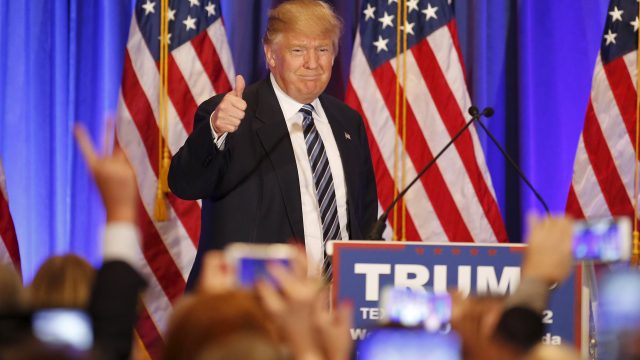John Andrist: Is Free Trade A Blessing Or A Curse?

U.S. Republican presidential candidate Donald Trump walks to the podium at a press event at his Trump International Golf Club in West Palm Beach, Florida, March 5, 2016. REUTERS/Joe Skipper
Andy Rooney was one of my heroes — sort of.
Like me, he was a columnist, but that sounds a bit pretentious for a small town wannabe kind of guy.
His column appeared in over 200 newspapers, and then there was that long gig for CBS on their Sunday “60 Minutes” news magazine, which had a 40-year life — interrupted a couple of times when they fired him for politically incorrect comments.
When I was given a copy of his book a number of years ago, “Pieces of My Mind”, I was jealous. I always thought that was a perfect description of my weekly rants, and I wished I had thought of that first.
Strangers I meet often ask what I write about, and all I can say is, “whatever comes to my mind”.
A funny thing came to my mind this week, and I want you to know it is perfectly okay with me if you find this too boring to continue.
Free trade is one of those public issues not even on the radar screen of most Americans. But it holds much fascination for me. I think it has an enormous hidden impact on the lives of everyone.
It did more than anything else to transform America from a sleepy 18th century beginning to the most dominant country in our world.
Early entrepreneurs like Henry Ford, the Rockefellers, and the Carnegies, although often ruthless and a bit corrupt, were on the cutting edge of the industrial revolution which produced millions of new American jobs.
[mks_pullquote align=”right” width=”300″ size=”24″ bg_color=”#ffffff” txt_color=”#000000″]Free trade was the partner which opened the world to American genius.[/mks_pullquote]
Free trade was the partner which opened the world to American genius.
When the rest of the world figured how to compete, however, many of them found a niche, often because of lower wages. Since that time trade policies have been a constant political football.
Free trade has done more to lift the people of our world than all the political rhetoric ever spoken, but has at the same time produced a huge number of victims, primarily workers who have lost jobs for lack of competitiveness.
Most presidents have supported broadening of trade, but this year more opposition has been stoked, particularly by Donald Trump and the Democrats running for president.
They have all portrayed free trading as a villain in our economy.
A man who has lost his job, for whatever reason, is a tempting target for political ambition.
In the last generation Americans have seen thousands and thousands of manufacturing jobs disappear — mostly to places abroad.
Let’s face it; we’re now second fiddle in manufacturing output.
So why don’t we have bread lines? Because we have created so many jobs that didn’t even exist a quarter century ago. They call them “information age jobs”.
There’s a guy in my facility who is 90-years old and simply a whiz at technology. He says, and he is probably right, that we will lose even more manufacturing jobs in the next forty years to robotics.
“Robots will be making everything”, he says.
Furthermore, he says, there will simply not be enough work to put bread on the table in most American homes.
So he believes we will have to make labor optional, and those who prefer to work will have to support those who choose not to work.
On that I disagree. As we have always done, we will create millions of new jobs that don’t even exist today, just as we have moved from a production society to an information society during this last generation.
Free trade will lead the way if we let it. But it will create a lot of havoc in the process, because the folks who lose jobs will not be the ones needed and capable of filling the new jobs.
We may have to reinvent education, using our colleges to train for marketable skills instead of running diploma factories.
That’s why I like our small colleges and tech schools. Because they have always focussed on producing workers instead of diplomas.
Well, I guess that’s my slice of mind for this week. I wish I could be around long enough to see how right or wrong I am.




